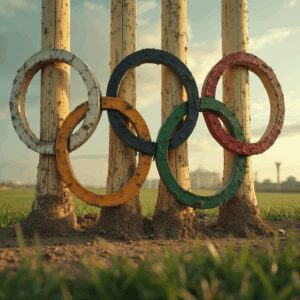IOC’s pandering power play continues unabated
Naivete is not a form of art. Instead, it may well be more reflective either of one’s gullibility or one’s immense thirst for power. That’s the view of this Columnist following ongoing analysis of what is currently transpiring in the world of sport that is not so ‘wide and wonderful’ after all.
Over the past several years we have witnessed as much corruption amongst sport leaders as we have amongst the athletes and their entourages in respect of the use and abuse of prohibited substances and methods.
Today, the world may well have more reasons to distrust sport than hitherto in history.
From inception, there has been a sense in which the International Olympic Committee seems to have abrogated unto itself a sort of right to control sport, ostensibly, in the name of facilitating peace, understanding and goodwill in the international community.
Over time, however, and particularly in the last 75 years, we have witnessed an amazing transformation to a kind of behaviour that suggests a right to lead and control international sport in a manner that hitherto some would probably have considered anathema to the organisation’s fundamental principles and values.
Today, as the Winter Olympics take place, more than ever before, the global spotlight brings into focus the numerous contradictions inherent in contemporary sport in respect of human dignity, human rights, money and power.
The athletes are pawns
Today, there is growing discontent amongst athletes from around the world at the fact that they are asked to ply their trade at the quadrennial Olympics for the enjoyment of the international community, under a charade of amateurism, if only briefly, whilst the International Olympic Committee (IOC) reaps the financial harvest.
The athletes are fast coming to the accepted view that they are mere pawns in a bigger game whose finances appear to be underwritten by financiers with long-term vision and reach regarding their own economic viability.
The author well remembers the stance of then IOC President, Juan Antonio Samaranch, who, in 1987/8 was taken around much of the world by Mexican media magnate and President of both the Pan American Sports Organisation (PASO) and the Association of National Olympic Committees (ANOC), Mario Vazquez Rana, meeting with government leaders in an attempt to avoid another Olympic Games boycott in 1988, Seoul, South Korea.
While in St Vincent and the Grenadines, Samaranch’s introduction to then Prime Minister, James Mitchell, addressed the importance of sport being separate from politics. After listening to the introductory remarks, the wily politician tat James Mitchell was, allowed him to say to Samaranch, ‘You say that sport and politics should be kept separate but so far you have only been speaking politics’. Samaranch was more than a little taken aback since it would appear that he may not have been expecting a political leader from a small country like St Vincent and the Grenadines to have been so adept at understanding the real intent of the visit and conversation.
The IOC has historically sought to convince itself that it somehow manages to keep politics out of the Games and the Olympic Movement. A close perusal of Olympic History would reveal that the international Olympic movement is about politics and that this has always been the case.
The Olympic Games has been the main pillar of the international Olympic movement. Had the Games not proven so financially strong the IOC would probably not have survived. Despite the fact that the IOC remains largely dominated by Europeans whose values are the ones being perpetrated by almost everything that it does, it is the Americans who have to be credited with the radical transformation of the IOC’s finances following the successful hosting of the Summer Olympics in Los Angeles in 1984.
When Samaranch opened the door to professional athletes for the Games in Seoul in 1988, it was clear to anyone willing to apply their critical thinking skills that this was an important step towards global leadership in international sport.
American, Avery Brundage, described by David Miller as a “despotic moralistic bulldozer”. That may have been a most apt description.
Many Black American athletes hold no brief for Brundage as he was involved in the situation in Mexico City in 1968, that saw Tommie Smith and John Carlos relieved of their medals for their podium-based protest and again, in 1972 when Vince Matthews and Wayne Collett were banned from the Olympic for life.
Unfortunately, the athletes have not, until now, considered their worth to the Olympic movement. It has never really been about the promotion of human dignity and worth nor about values. It has always been about the bottom-line, the right and power of dictating the terms and conditions of the engagement of the athletes as mere pawns.
Human Rights
To many critics, the IOC has never really had the moral authority to speak on the matter of human rights.
The preponderance of monied interests amongst those invited to serve as members of the IOC raises numerous unanswered questions.
History is replete with examples of the rich equating their wealth with power. It has also been the case that the rich and powerful often condescendingly dictate to the lower classes what they perceive to be best for the latter, often knowing that the latter lack the capacity to determine otherwise, given their lack of resources. That has been the history of the world.
There can be no difference in sport. The evidence is before us all.
The values that have been brought together and heralded as the ‘Olympic values’ do not seem to apply either to the wealthy financial magnates who pour millions through their companies into what is the TOP sponsor programme or the majority of those invited to serve on the IOC.
Indeed, the very fact that the IOC operates as a sort of self-perpetuating entity that is often seen as perhaps twisting the norms of democracy, seems to suggest that the institution is above reproach. No such thing. That is a fallacy that is also perhaps, more than a little self-serving.
Human rights issues have always been with the international community and they have impacted sport. We have had the situation with Hitler and his treatment of Jews and outright racism, apartheid in South Africa, racial segregation in the US, human rights abuses in numerous countries around the world.
It remains a major contradiction that an institution like the IOC, which projects itself, almost self-righteously, as the purveyor of wholesome principles and values integral to Olympism, will allow itself to find ‘clever’ ways of explaining away what to many, appear recalcitrant, in respect of blatant human rights abuses in so many of the countries from which their members come.
The Games of 1936 ought never to have been hosted in Germany given the international community’s understanding of the truth of Hitler’s political regime. Having hosted the Games in Hitler’s Germany did nothing but highlight the charlatanism of the Olympic movement.
The IOC appeared to turn its back on the chronic apartheid system in South Africa until it was forced into a vote that finally respected the advice of the Supreme Council for Sport in Africa, in 1968, just ahead of the Summer Olympics in Mexico City. Brundage was of the view then that the IOC’s only concern in South Africa was not the plight of the people under the yoke of apartheid but rather, “with the NOC and what it is doing to comply with the Olympic regulations.”
The IOC has turned deaf on the complaints of and evidence provided by reputable international agencies on human rights abuses in countries that have taken the Games. To many observers, this remains a fundamental slap in the face of those who seem to think that justice has a place in sport and that sport can aid in the administration of justice.
Unfortunately, justice is not necessarily where one can turn for the very concept of fair play that is so often touted by the IOC and other international sports organisations.
If indeed we are to accept the IOC’s version of things in China relative to international tennis star, Peng Shuai, we can expect to see her make a quick return to the international professional circuit outside of China sometime soon. Our analysis suggests otherwise.
This is the same IOC that one of its members, Richard Pound, observed recently that he knew that once he led the investigation into his colleagues that were involved in the Salt Lake City Scandal, it would ruin his chances of ever being elected president of the IOC. What does this tell us about the organization to which he has devoted much of his life?
Money! Money! Money!
The spat between FIFA, the IOC and some continental football federations, is all about money and power.
The IOC’s decision to hist four Olympics in any quadrennial was driven by what motives? We have Summer and Winter Olympics each for seniors and juniors.
With its continental associations also increasing the number of multisport Games they are hosting in each quadrennial, international sports federations (IF) and their continental and regional bodies are left with little space on the quadrennial calendar to organize their own Championships.
What we are seeing is that IFs are gradually being forced into becoming the beggar-maids of the IOC, relying, increasingly, on income from the TV Rights of the multisport Games for the bulk f their income.
At the national level, especially in small, open and highly vulnerable economies, national sports associations can no longer rely as heavily as hitherto, on their respective NOCs for funding given the,
Not surprisingly, the Europeans, ever anxious to play the leading role, has started the European Championships in 2018, with its second edition scheduled for 2022.
The edition of 2018 featured Aquatics, Cycling, Golf, Gymnastics, Rowing and Triathlon shared between Glasgow and Berlin.
This year the Championships will be in Munich and features, Athletics, Beach Volleyball, Canoe Sprint, Cycling, Gymnastics, Rowing, Sprint Climbing, Table Tennis and Triathlon.
The rationale for the multisport Championships is pivoting on the idea of the growing popularity of multi-sport events over and above individual Championships. The revenue stream is seemingly endless.
Given the global popularity of Football, the IOC is scared over the potential negative impact that FIFA’s biennial world cup proposals portend. It is as simple as that.
EUFA would like to retain its dominance amongst football associations and inside FIFA. Like the IOC, EUFA is seeking to preserve its bottom line. The same can be said of CONMEBOL.
For all of the pronouncements made by the IOC and others, the fact is that the decidedly embarrassing Salt Lake City Scandal and the revelations of bribery as integral to the bidding processes for decades before that, and the unfolding football scandals that initially saw 14 FIFA executive members arrested and charged in different jurisdictions, have done little to lead to a reduction in sponsors. The latter also know and watch their respective bottom lines and are aware of the eagerness of others waiting on the outside to fill any breach in sponsorship.
The Caribbean ditty speaks volumes. It simply reminds us that ‘money talks…’






